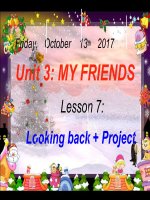Unit 09. Natural Disasters. Lesson 7. Looking back project
Bạn đang xem bản rút gọn của tài liệu. Xem và tải ngay bản đầy đủ của tài liệu tại đây (2.08 MB, 22 trang )
English 8
UNIT 9 . NATURAL DISASTERS
PERIOD 77: LOOKING BACK + PROJECT
Welcome to our class
* Warm - up.
flood
mudslide
forest fire
volcano eruption
tsunami
drought
tornado
earthquake
I. New words:
- slide
( v)
: trượt, chuyển động, chảy (bùn)
- reservation (n): sự đặt trước (đặt phòng)
- pass (n)
- put on (v)
: vé tháng, hộ chiếu
: dựng lại (vở kịch)
A. VOCABULARY
1. Match the words (1-6) to their definitions (A-F).
Words
Definitions
A. a violent storm with very strong winds which move in a circle
1. drought
B. a huge wave that can destroy towns near the sea
2. mudslide
C. a long period when there is no rain and not enough water for people,
animals and plants
3. flood
D. a large amount of water covering an area that is usually dry
4. tsunami
E. a sudden, violent shaking of the Earth’s surface
5. tornado
F. a large amount of mud sliding down a mountain, often destroying
buildings and injuring or killing people below
6.earthquake
1.
C 2.
3.
F 4.
5.
D 6.
B
A
E
2.Use the words from the box in the correct form to complete the sentences.
scatter
1.
take
evacuate
put out
provide
Emergency workers ___________ the village when the river flooded the area.
2. Rescue workers are still trying to __________ the forest fires.
3. The strong winds forced the climbers to _______ shelter.
4. Many countries have __________ food and other material aid to the hurricane victims.
5. Debris from collapsed buildings was __________ across the whole area.
B. GRAMMAR
THE PASSIVE VOICE :
Example:
Active:
Rescue workers have freed ten people trapped in collapsed buildings .
S
V
O
Passive:
be
+ PP
S
Ten people trapped in collapsed buildings
have
freed
been
by rescue workers.
(by) + O
B. Grammar
3. Decide which of the sentences can be changed to passive voice. Write them down. Explain why two of them
cannot.
1. Mr Smith will collect the tickets.
___________________________________________
2. The students put on a play at the end of term.
___________________________________________
3. Jim is always late for work.
___________________________________________
4. Julie took the message.
___________________________________________
5. A local artist painted the picture.
___________________________________________
6. They arrived at the theatre at 8.30 p.m.
___________________________________________
B. Grammar
3. Decide which of the sentences can be changed to passive voice. Write them down. Explain why two
of them cannot.
1. Mr Smith will collect the tickets.
The tickets will be collected (by Mr Smith).
2. The students put on a play at the end of term.
A play was put on (by the students) at the end of term.
3. Jim is always late for work.
The sentence cannot be written in the passive because its main verb is not a transitive verb.
B. Grammar
3. Decide which of the sentences can be changed to passive voice. Write them down. Explain why two
of them cannot.
4. Julie took the message.
The message was taken (by Julie).
5. A local artist painted the picture.
The picture was painted by a local artist.
6. They arrived at the theatre at 8.30 p.m.
The sentence cannot be written in the passive because its main verb arrive is not a
transitive verb.
4. Match the two parts to make complete sentences.
1. After our plane had landed,
a. we learnt they had lost our reservation.
2. We found out the train had left
b. until I decided to study
3. When we got to the hotel,
abroad.
4. I had never really travelled
c. before I fnished eating my meal.
5. The waiter had taken my plate
d. we waited an hour for our luggage.
6. As I stepped onto the bus,
e. I noticed I had left my pass at home.
f. ten minutes before we got to the station.
1. d
2.
3.
f 4.
5 . a 6.
b
c
e
5a. Imagine five bad things that happened to you yesterday, and
write them down.
Example:
- Someone stole my bike.
-
My sister broke my compute
.............
Suggested answer
- My bike broke down on the way to school.
- I went to school late.
b. Work in groups.
Add time clauses to your sentences as the following examples. Remember to
use the past perfect
Past perfect tense:
(+) Positive
S+ had + past pariciple
Ex: I had left when they came.
(-) negative
S + had not( hadn’t) + past participle
Ex: I hadn’t left when they came.
(?) Questions
Had + S +past participle?
Yes, S + had / No, S + hadn’t
Ex: Had you left when they came ?
b. Work in groups.
Add time clauses to your sentences as the following examples. Remember to
use the past perfect
When I woke up yesterday morning,
somebody had stolen my bike.
When I got home yesterday,
computer.
my sister had broken my
Do you remember the responses? Write them into the correct columns.
Wow !
That’s awful !
Oh no!
How terrible !
That’s shocking!
How wonderful !
That’s awesome!
That’s great !
Oh dear!
That’s relief !
Responding to good news
Responding to bad news
C. COMMUNICATION
6. Read the news headlines. In pairs, use the expressions from the box in GETING STARTED to respond to
them.
Six-year-old rescued from forest fire by pet dog
Temporary accommodation set up for volcano
victims
Hundreds of homes damaged or destroyed in
One million dollars raised for typhoon victims
Haiti by tornado
in the Philippines so far
Earthquake survivors found under debris after
Debris finally cleared by rescue teams
ten days
Example:
A: It says here that a six-year-old girl was rescued from a forest fire by her pet dog.
B: Wow! That’s amazing!
D. PROJECT
1. These activities aiming to provide aid for victims of natural disasters.
Write a phrase to describe each picture.
A Helping Hand
1 providing (food/ medical)
supplies
2
clearing up debris
3 freeing trapped people
4
setting up temporary
accommodation (for the victims of 5
repairing houses/ buildings
a disaster)
6 evacuating the village/ town ...
to a safe place/ area
2. Work in groups
Imagine you are members of a volunteer team who are going to provide aid for the
victims of a natural disaster. Work out a plan for your team.
- Provide food, medical aid supplies.
- Cleaning up debris.
3. Share tour plan with other groups. Vote for the best
plan.
Thanks for your attention
Good bye. See you again !









